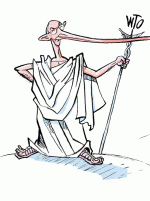Distorting reality - the EC's misleading rhetoric
"Q: [W]hat are the three most important problems that need to be solved for the Doha Round to succeed? A: Development, development, and... development."
EU Trade Commissioner Pascal Lamy, Wall Street Journal Europe, July 17, 2003
The feel-good rhetoric used by the European Commission, and in particular its trade arm DG Trade, has drifted farther than ever from the reality of the policies the Commission is pursuing. Portraying itself as a more caring, more environmentally friendly, more multilaterally-minded alternative to the United States, the Commission liberally sprinkles its policies with largely unsubstantiated 'sustainable development' and 'pro-development' rhetoric. The Commission's true agenda is hidden in the spin: the forcing open of new markets for the goods and capital of the EU's transnational corporations.
Perhaps the most insidious piece of Commission rhetoric is the term "Doha Development Agenda (DDA)", which an alarming number of commentators, including the World Trade Organization (WTO) Secretariat, uncritically reproduce in articles and speeches. It is easy to forget that DDA, a term the Commission and, in particular, its trade arm DG Trade, now promotes at every opportunity,[1] has no basis whatsoever in official WTO texts. Commission officials were among the first to start using the DDA term (which implies that the Doha round of negotiations will particularly benefit developing countries), only twenty-four hours after the conclusion of the Doha ministerial meeting.[2] This was truly a sad irony given that the Commission had just ridden roughshod over developing country concerns to promote what many groups called an "everything but development" agenda.[3] Comparing the results of the Doha meeting with the abortive WTO Ministerial Conference in Seattle in late 1999, which collapsed largely because of developing country opposition, Harvard economist Dani Rodrik has queried, with some puzzlement, how "an agenda little changed from Seattle could now serve as the basis for a development round."[4]
The Commission's deeply controversial push for a WTO global investment agreement has been fertile ground for particularly audacious spin.[5] In March 2003, the Commission suddenly started referring to the potential agreement as an "Investment for Development Framework (IDF)".[6] Given that developing country governments and civil society vociferously oppose the plan because of the threat it poses to development, the Commission's re-labelling is particularly offensive.
In Cancun, where North-South conflicts will dominate negotiations, the EU will likely step up its spin operations and continue painting itself a champion of the environment and poor to hide its true self-serving agenda.
Notes:
- "The only other positive outcome on trade was the strong developing country rejection of the EU's attempt to spin the current WTO negotiations as good for development -- references to the Doha Development Agenda were changed throughout the text to the Doha Agenda." Source: "The world's biggest summit -- so what? Making sense of the World Summit on Sustainable Development, World Development Movement, September 4, 2002. Back
- Romano Prodi, president of the European Commission, used the "DDA" term in a statement on November 15, 2001: "I am extremely pleased about the launch of a new Doha Development Agenda round." (The Doha meeting ended on the morning of November 14). Statement by European Commission President Romano Prodi on launch of new round. Back
- "The results of Doha have been shamelessly touted by developed countries and the Secretariat as a 'development agenda' or a 'development round'. In our view, nothing could be further from the truth. Indeed, the Doha Declaration and its work programme can best be called 'Everything But Development'. It is a development disaster.", Joint Statement of NGOs and Social Movements: International civil society rejects WTO Doha outcome and the WTO's manipulative process, November 2001. Back
- Free Trade Optimism: Lessons From the Battle in Seattle, Dani Rodrik, Foreign Affairs, May/June 2003. Back
- See The EC's push for a WTO-Investment agreement, The European Commission's Hall of Shame, Corporate Europe Observatory, September 2003. Back
- See The EC's Trojan Horse: The Investment for Development Framework, Geneva Update, April 9, 2003.
See also Trade and investment: new EU paper on policy space for development, Bridges Weekly Trade News Digest, ICTSD, April 16, 2003. Back
